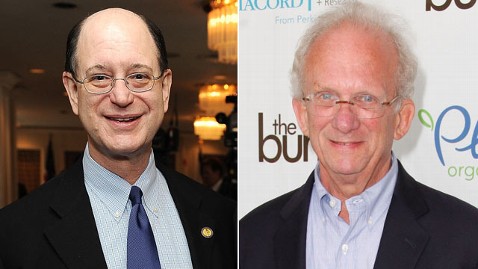California 'Jungle Primary' Alters November Landscape

(Image Credit: Getty Images)
It's a jungle out there, as Californian's discovered this week when they cast ballots in the state's first nonpartisan primary that sent the top two vote-getters, regardless of party, to the November general election
The so-called jungle primary listed all candidates on one single ballot, resulting, for instance, in an all-Democratic general election in one newly drawn Southern California congressional district.
Approved by voter referendum in 2010, nonpartisan primaries are envisioned as a way to help break the state's political gridlock. "I believe that the way to fix it and reform California is to put in an open primary 'top-two,'" Lt. Gov. Abel Maldonado, a former state senator, said on KQED public radio this week.
After the state's most competitive Democrat-vs.-Democrat primary, Rep. Brad Sherman and Rep. Howard Berman will appear on the ballot in the Los Angeles-area's 30 Congressional District.
Read more about the race between sitting Reps. Sherman and Berman here.
Thad Kousser, a political science professor at the University of California, San Diego, said there's no way to gauge the effects of the new system until the general election results are in. The potential upside, he said, is that the process will pull California politics "back to the middle." On the other hand, however, there is the potential for a small group of voters to choose who wins, he added.
Other states use open primaries, but Democrats and Republicans still usually end up facing off in general elections.
What makes California's system so compelling, for example, is that an important swing district can be dominated by two members of the same party for the general election. In one case, Democrats had difficultly securing a candidate in GOP Rep. Gary Miller's swing district. Now, Miller will face a fellow Republican in November.
Read more about the double Republican race here.
Not everyone is convinced of the new system's value. Mark Paul, who teaches at U.C.-Berkeley and is co-author of "California Crackup: How Reform Broke the Golden State and How We Can Fix It," said the newly established jungle primary does not promote bipartisanship. The politicians, he said, are more a window onto divisions that already exist.
"Politicians reflect deep divisions in our country," he said, adding that "bipartisanship is a virtue; there is no hunger among the voters to compromise themselves."
The most important element of the jungle primary in California, Paul said, is that it has "elevated in importance of money."
"If parties don't play the primary role in politics, special interest groups will," he said.
Voter turnout in Tuesday's California primary was at a historical low. That might have resulted from Mitt Romney's already clinching the GOP presidential nomination, but Paul also cited voter confusion as Californians go through the political transition.
Professor Kousser said "low voter turnout for California doesn't have anything to do with the jungle primary," and that Californians "barely noticed" a difference in their primary format.